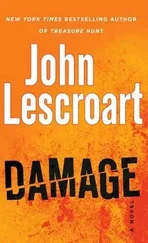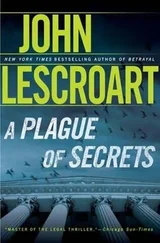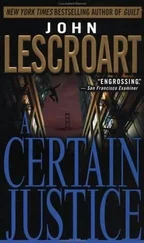Of course it was he—the high forehead and dark brown hair, combed straight back; the eyes not quite open and yet missing nothing; the heavy lips puckering after every swallow. I, too, had a paper, and settled back to watch him. He was a big man and looked immensely strong, even dressed in an ill-fitting brown suit. His yellow shirt, which would have been garish, or—worse—memorable, on an assassin, was tight across his middle, but didn’t bulge at the waist.
The garçon came out to his table with two more beers, removed the two empty glasses, and was returning when I stopped him for two of my own. Lupa had set the paper down and was leaning back with a beer. He let the foam settle slightly, then took a deep swallow, draining the contents of the glass in a single gulp. As he lowered the glass to the table, his eyes narrowed slightly, and the corners of his mouth turned suddenly downward.
The garçon came with my beer. It was still a bit early, and Lupa and I were the only people there. He looked at me briefly when my beer arrived, and I nodded, the informal recognition of two people sharing the same type of moment. His head inclined a mere centimeter, then turned back to the newspaper.
I reached for the beer and took a small drink, making an elaborate face of disgust. Crossing my legs, I sat back and picked up the paper, stopping every two or three minutes to continue my little charade with the beer: a sip, a look of distaste, meant of course only for myself but obvious to anyone, especially to Lupa. I set the first glass down when I’d finished, and with a little flourish pushed the empty glass as far from me as the table allowed. I then stared down the street, glaring.
Lupa finished his third glass and leaned back with his eyes closed, drumming his fingers methodically on the edge of the table. After a few seconds his fingers came to an abrupt halt, and he glanced over at me.
“Mal,” I said with a weak smile.
“Insupportable!” He took the other glass and poured it slowly to the ground. The corners of his mouth turned slightly upward, and he watched me. “ J’en ai marée. I’ve had enough.”
I took a gamble and decided to make a scene.
“Garçon!”
When he arrived, I spoke too loudly. “This beer is horrible. It is possibly the worst beer in France, and at any rate it’s the worst I’ve had. This gentleman”—I nodded in Lupa’s direction—“has just poured his to the sidewalk, where it belongs, and I only refrain because I deplore waste, especially during wartime. Take this glass, remove it, and give its contents to the plants or the pigs, then bring me a glass of wine.” I looked at Lupa. “Sir, would you join me in a glass?”
He nodded. “Thank you, I would. And Charles,” he said to the waiter, “don’t pour it on the plants or use it in the mustard. Perhaps it wouldn’t completely destroy the pork.”
He crossed to my table and bowed, more an inclination of the head than a bow.
“Auguste Lupa,” he said.
“Jules Giraud.” I motioned to the empty chair.
We sat, and he began to talk.
“I, too, sir, deplore waste, though I could argue that there was no waste involved in pouring that beer to the ground. That beer was waste when it arrived, and what pains me is that I’ve been putting up with it for months now. I am indebted to you, Monsieur Giraud. Sometimes I need a nudge to act, though I generally decide instantly on matters of taste; but I have an inordinate fondness for beer, and since good beer cannot be purchased here, I’ve allowed my integrity an unforgivable laxity.” He closed his eyes and sighed, and there was, indeed, a burden of sadness around him. “It will be hard without beer, but my taste applauds yours, sir.”
The wine arrived, and he raised his glass, after first sniffing it and looking through the dark red liquid. “Santé,” he said, “and damn this war.”
We both drained our glasses. He signaled for another, and I began to smile.
“You’re amused?” he asked.
“It seems strange,” I said, raising the second glass, “to find myself agreeing with a man whose major concern in the midst of European destruction is the lack of quality beer.”
“But you do agree.”
“Of course, damn it.” I smiled again. “The living must continue to live. But you are wrong about something,” I said.
“And that is . . . ?”
“The dearth of good beer. There is a great quantity of excellent beer not four kilometers from where we sit. But it is not for sale.”
He looked at me patiently and warily. “Monsieur Giraud, I don’t know you, but you don’t seem given to idle jesting. I have been cooking here in Valence for the winter and have searched tirelessly for a supply of good beer, and to no avail. I have some talent at discovering things that people try to keep hidden, and there is no beer.”
“There is, and it is hidden, and privately brewed by a man who values his privacy. No more than six men know of it.”
“They are very discreet men,” he said.
“Very,” I continued. “They have to be, but that’s no matter. Even knowing that the beer exists, you would never find it, for you’re not likely to see me again and you don’t know the other five.” I drained my glass and got up to go. “It’s been a pleasant morning, sir,” I said. “Good luck.”
I hadn’t gone ten paces when he spoke.
“Monsieur Giraud.”
I turned. “Yes?”
“Would your chef mind terribly if you missed a meal?”
“He goes nearly mad,” I said, “but occasionally—” I stopped abruptly. “How did you know I had a chef?”
He nodded, his eyes narrowing somewhat, perhaps with humor. “You’ve just confirmed it.”
“Yes, but . . .”
“Monsieur Giraud,” he said. “There was nothing sinister, I assure you, in the question. It was mere conjecture.”
“But how . . . ?”
“Simplicity itself. It’s clear that you are a man of taste regarding your palate. Your clothing further bespeaks a certain degree of wealth, and your accent—indeed, even the way you hold a wineglass—betrays good breeding. Finally, your coloring is pale.”
“Yes?”
“Surely that is enough.”
I laughed in spite of myself. “I’m afraid I don’t follow you.”
He ticked off the steps of his deduction with the fingers of his right hand. “First, you can afford a chef. Second, you would demand fine meals, especially at home. Third, if you yourself spent the required amount of time behind a hot stove, your complexion would be ruddy like my own. It is not. Ergo, you have a chef.”
“You’re very astute,” I said.
He waved it off. “It’s nothing. Child’s play. Literally, in my case. My father was something of a stickler for such matters. I’ve kept it up as a hobby, more or less. Just now I made an educated guess, and your reaction confirmed it. True deduction is a closed system—it confirms itself.”
“Still, I’m impressed.”
“Well, then perhaps you’ll permit me to impress you with my small skills as a chef. Would you care to lunch?” The eyes were sharp now, though the face was relaxed and friendly.
“It’s rather early,” I said, hesitating a moment.
He continued. “Egg of pigeon poached in red wine, escargots, rognons aux fines herbes, all accompanied by the finest wine on the Côte du Rhone, served at the chef’s table.”
“It is a great temptation,” I said. “You, of course, though you haven’t said it, would greatly appreciate an introduction to a certain local brewer I mentioned.”
He smiled. “Your deduction, though obvious, is flawless.”
“And your discretion?”
“Unimpeachable.”
I walked back to him.
Читать дальше












